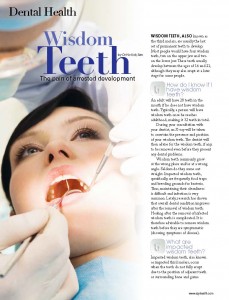This article first appeared in the November 2014 issue of Ezyhealth magazine. We have reproduced it for the information of those of you who missed it when it was published.
Wisdom teeth, also known as the third molars, are usually the last set of permanent teeth to develop. Most people would have four wisdom teeth, two on the upper jaw and two on the lower jaw. These teeth usually develop between the ages of 16-21, although they may also erupt at later stage for some people.
How Do I know if I have Wisdom Teeth?
An adult will have 28 teeth in the mouth if he does not have wisdom teeth. Typically, a person will have wisdom teeth once they reach adulthood, making it 32 teeth in total.
During consultation with your dentist, an X-ray will be taken to locate for the presence and position of your wisdom teeth. The dentist will then advise for the wisdom teeth, if any, to be removed even before they present any dental problems.
Wisdom teeth commonly grow at the wrong place and/or at a wrong angle. Seldom do they come out straight. Impacted wisdom teeth, specifically, are frequently food traps and breeding grounds for bacteria. Thus, maintaining their cleanliness is difficult and infection is very common. Lately, research has shown that overall dental condition improves after the removal of wisdom teeth. Healing after the removal of infected wisdom teeth, is complicated. It is therefore advisable to remove wisdom teeth before they are symptomatic (showing symptoms of disease).
What are Impacted Wisdom Teeth?
Impacted wisdom teeth, also known as impacted third molars, occur when the teeth do not fully erupt due to the position of adjacent teeth or surrounding bone and gums. Even when the wisdom teeth do erupt properly, there may be a tight fit in the back of the mouth, making it very hard to clean them properly – leading to decay.
What Happens during Wisdom Teeth Removal?
The procedure can be performed under local anaesthesia alone, or together with intravenous sedation, which puts patients in a relaxed state of mind and significantly reduces any anxiety factors.
Sedation can be done in the clinic with the assistance of an anaesthetist who will administer the sedation and monitor the patient’s vital conditions. General anaesthesia usually takes place in a hospital or day surgery centre and increases the total cost of treatment. Whichever method selected to remove wisdom teeth, with proper expertise, wisdom teeth removal can be accomplished under an hour for all four teeth or under 30 minutes for two teeth.
It is considered a minor surgical procedure which can be performed in the clinic by your dentist with little discomfort. Depending on the size of each individual’s wisdom tooth, it may need to be sectioned. The surgeon will then stitch the gums back. Most of our patients report they can get back to normal daily activities within a few hours after wisdom tooth surgery. A reasonable dinner is commonly expected. We usually hear back from our patients that they were surprised by how little discomfort they experienced after the surgery.
Are there any side effects/risks?
By nature, wisdom teeth in the lower jaw are close to the nerve in the middle of our lower jaw. Research shows that there is an approximately 1% to 2% chance that the nerve may be touched during the procedure. If that happens, the lip and/or tongue may feel numb while your appearance, speech and lip mobility remain the same.
A skin cut heals within a few days but nerve recovery take months. Given a long enough time, the vast majority of the numbness will go away. Only extremely rarely do we see permanent numbness. One thing for sure, our dentists always do their best to avoid such risks and our clinical record has been excellent in this aspect.
Every patient is unique, but generally, we will advise the removal of wisdom teeth when there are some changes in the mouth, such as:
- Pain
- Infection
- Tooth Decay
- Gum Disease
The condition of our mouth constantly changes, so wisdom teeth that are not removed may still pose a potential problem later on.
The younger one is, the easier the removal of the wisdom teeth, as the bone is more elastic and the roots are shorter. With proper management, the procedure is smooth and seldom causes any significant swelling or discomfort afterwards.
Regular dental visits are important so your dentist can evaluate not just your wisdom teeth, but also your overall oral health to help you prevent and manage dental disease and achieve optimal oral health.
‘Moolah for Your Molars’
Patients who are Singaporeans or Permanent Residents of Singapore may be able to claim a portion of their surgical expenses from their Medisave Account. The amount covered by Medisave will vary. The exact claim amount for wisdom teeth surgery would depend on the complexity of the procedure.
Dr Ho Kok Sen is an Oral & Maxillofacial Surgeon with Specialist Dental Group®. He has a special interest in dental implants, jaw surgery, bone grafting and complex extractions. For more information, visit www.specialistdentalgroup.com.







